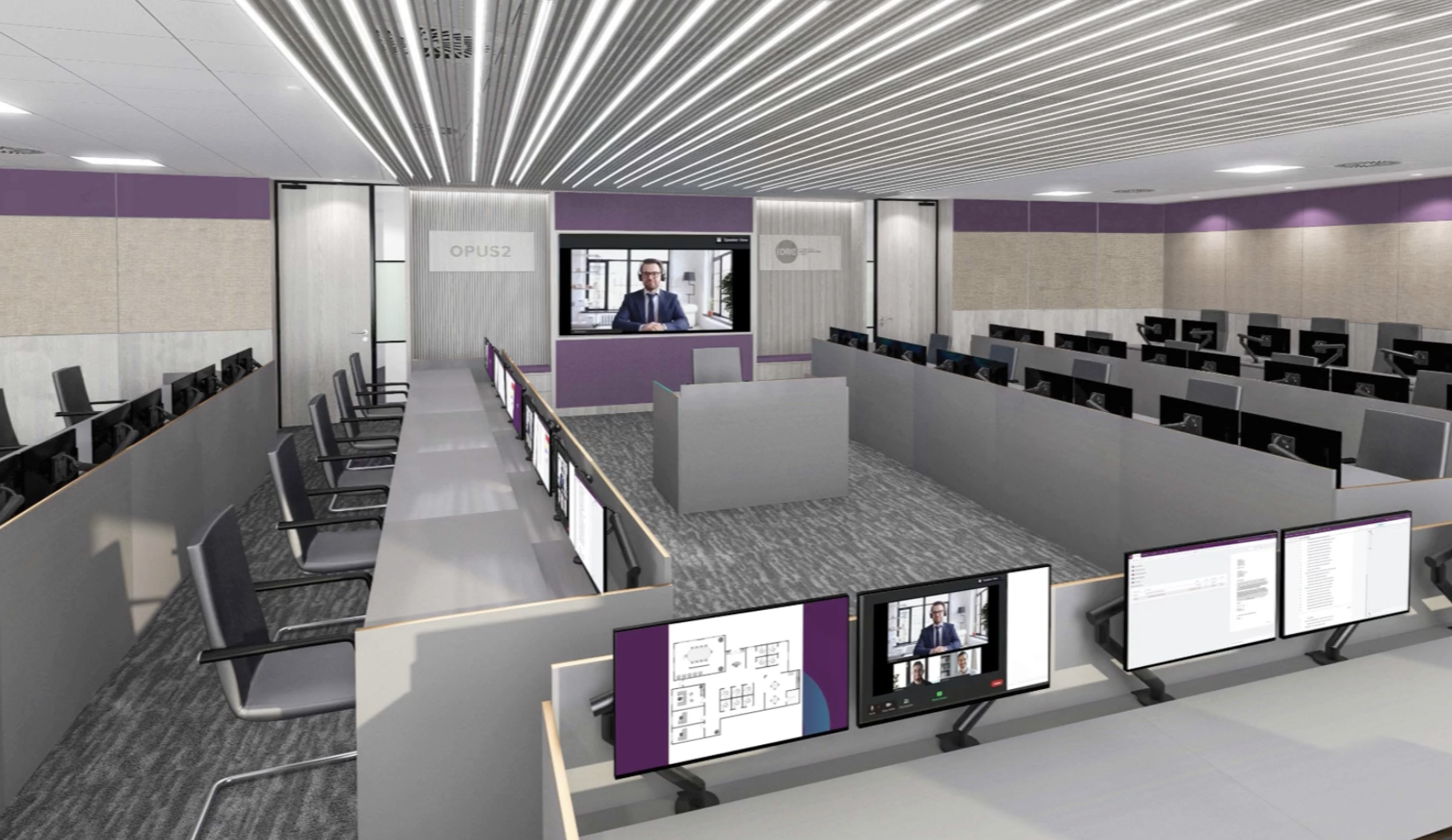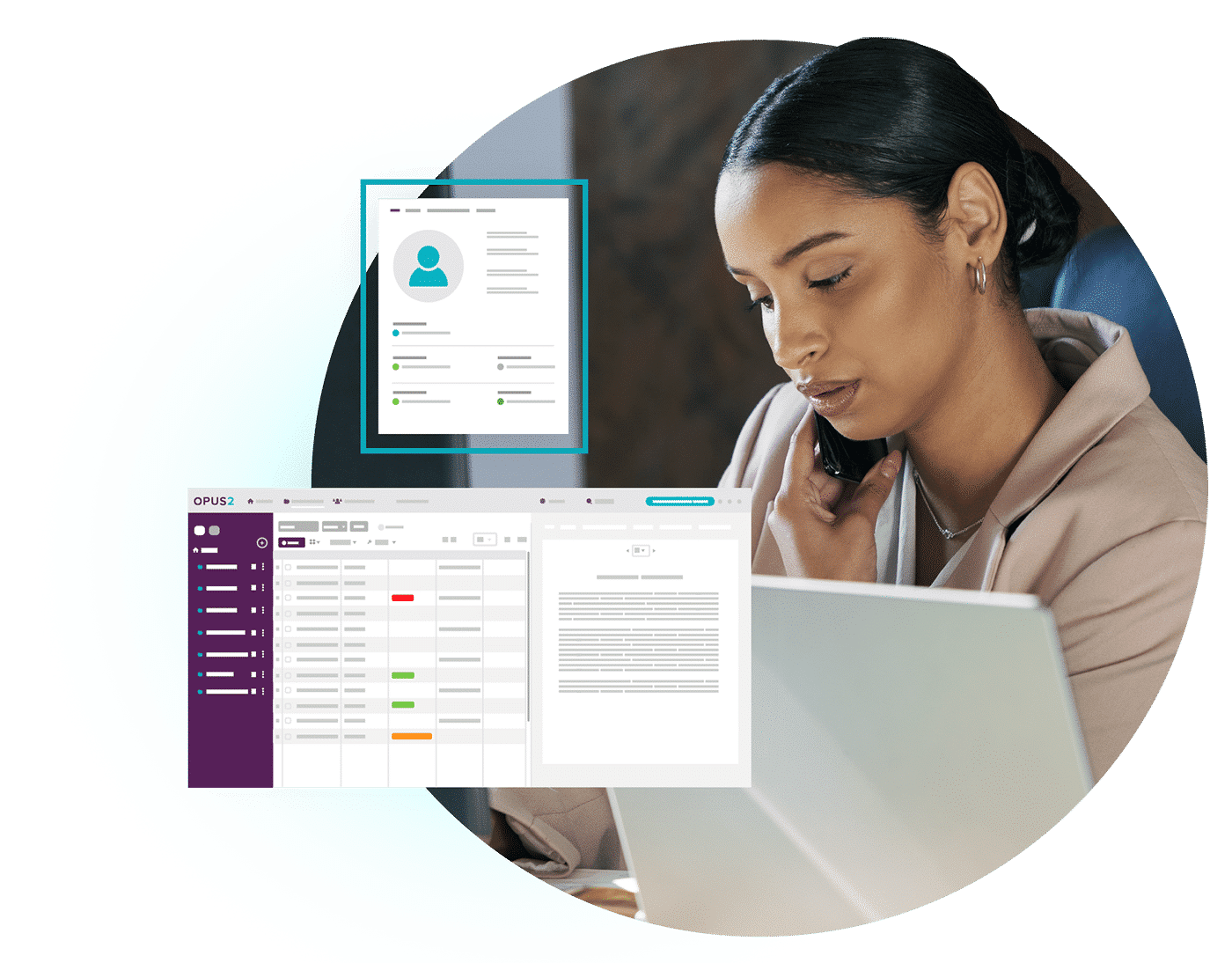Benefit from cutting-edge technology and expert services, wherever you need them

Deliver continuity and confidence
From pre-hearing planning to the post-hearing conclusion, every participant (whether in person or connecting remotely) has a consistent, reliable experience.

Simplify logistics, manage costs
Using hybrid and virtual hearing connections can reduce travel and venue costs, while simplifying logistics—especially in multi-party or cross-border matters.

Ensure access and participation
Accommodate time zones, locations, and preferences. Hybrid and virtual proceedings empower participants to fully engage, supporting fairness and accessibility.
Explore hybrid and virtual hearings
For more than 15 years, Opus 2 has delivered cutting-edge dispute resolution technology and services. Plan a seamless hybrid or virtual hearing with these essential resources.
Virtual
Hybrid
Timeline
Checklist
Virtual hearing guide
Coordinating a hearing with virtual connections requires careful consideration and planning.
This guide to virtual hearings shares how to:
• Learn the elements involved in virtual hearings
• Compare virtual and traditional in-person hearings
• Explore key considerations when planning a virtual hearing
• Identify common challenges and how to solve them
Hybrid hearing guide
Hybrid hearings offer a wide range of configuration options. Explore common scenarios to identify the setup that best suits your needs.
This guide offers common scenarios as well as:
• Best practices for hearing configuration
• Considerations for in-person and remote connections
• Details on remote audio-visual solutions

Virtual hearing timeline
Ready to start planning services for your next hybrid or virtual hearing?
This timeline, developed by our team of experts, offers a chronological overview of the steps, information, technology, and training required from instruction to post-hearing.
Explore key considerations, what you can expect, and how Opus 2 will work with you to ensure a seamless experience.

Virtual hearing checklist
Use this detailed checklist for the various stages of planning and conducting a virtual hearing to ensure a seamless experience. The guide includes information for both passive and active participants including:
• Services requirements and venue considerations
• Setup for primary hub and in-person venues
• Technology recommendations for remote participants
• Pre-hearing preparations and testing


Our services make a world of difference
Though we offer the most innovative software available for hearings, our people play an equally critical role in delivering successful proceedings—thousands of them worldwide since 2008. When you select Opus 2 Hearings as your solution of choice, you’ll always work with a highly skilled, dedicated team of case and solution experts plus experienced, best-in-class court reporters and EPE operators.

The most technologically advanced venue in the world
Located at the International Dispute Resolution Centre (IDRC) in London, the IDRC Opus 2 Suite is a state-of-the-art hearing venue for litigation and arbitration. Equipped with cutting-edge technology, the venue is ideal for hybrid and virtual hearings and delivers a fully connected experience for all participants.
FAQ: Hybrid and virtual hearings
What is a virtual hearing?
A virtual hearing is a legal proceeding where all participants join remotely using secure video conferencing and electronic hearing tools. Evidence is shared digitally, and services like real-time transcription and interpretation keep the process aligned with in-person standards. This approach is often used for procedural hearings, pre-trial matters, and cases with participants in multiple locations.
What’s the difference between a hybrid and a virtual hearing?
A virtual hearing is conducted entirely online, with all participants joining remotely through secure video and audio links. A hybrid hearing combines in-person and remote participation, with some people in the physical hearing room and others joining virtually. Both approaches use specialised hearing technology to share evidence, manage proceedings, and connect participants seamlessly.
What’s the difference between Opus 2 and Zoom?
Zoom is a general-purpose video conferencing tool, while Opus 2 Hearings is a complete, managed solution for legal proceedings. Opus 2 provides purpose-built hearing technology, integrated evidence presentation, real-time transcription, interpretation, and expert support before, during, and after the hearing. We also act as a neutral third party, managing all technical and operational aspects so legal teams can focus on the case.
How does a virtual hearing work?
Participants connect to a secure virtual hearing platform from approved locations, with technology and protocols in place to replicate an in-person process. Evidence is presented electronically, and a court reporter produces a real-time transcript. A dedicated virtual hearing manager ensures smooth operation, testing connections in advance and handling any technical issues during proceedings.
Does Opus 2 integrate with other video conferencing apps?
Yes. Opus 2 can work alongside platforms like Zoom or Microsoft Teams when required, integrating them into our managed virtual hearing environment. We ensure video conferencing tools connect seamlessly with our evidence presentation, transcription, and participant management systems.
Why would a hearing need hybrid or virtual services?
Hybrid and virtual hearings reduce travel costs, improve accessibility for dispersed participants, and allow proceedings to continue when in-person attendance is impractical. They are especially useful for cases involving international parties, large teams, or witnesses in different locations. With professional management, they deliver the same level of efficiency and clarity as in-person hearings.
What kinds of proceedings can be conducted virtually?
Many types of legal proceedings can be held virtually, including procedural and preliminary hearings, arbitrations, mediations, and full trials in certain jurisdictions. They are commonly used for international arbitration and hearings with geographically dispersed witnesses. Suitability depends on rules, case complexity, and the parties’ preferences.
What do I need to know to book hybrid or virtual hearing services?
To book, consider the type of hearing, participants’ locations, and the technology available at each site. We’ll assess your requirements, recommend the best setup, and provide managed services including case management, hearing room design, technology, and on-site or remote support. Contact our team early to allow time for planning, testing, and training all participants.
Upgrade and enhance your next proceeding with Opus 2


